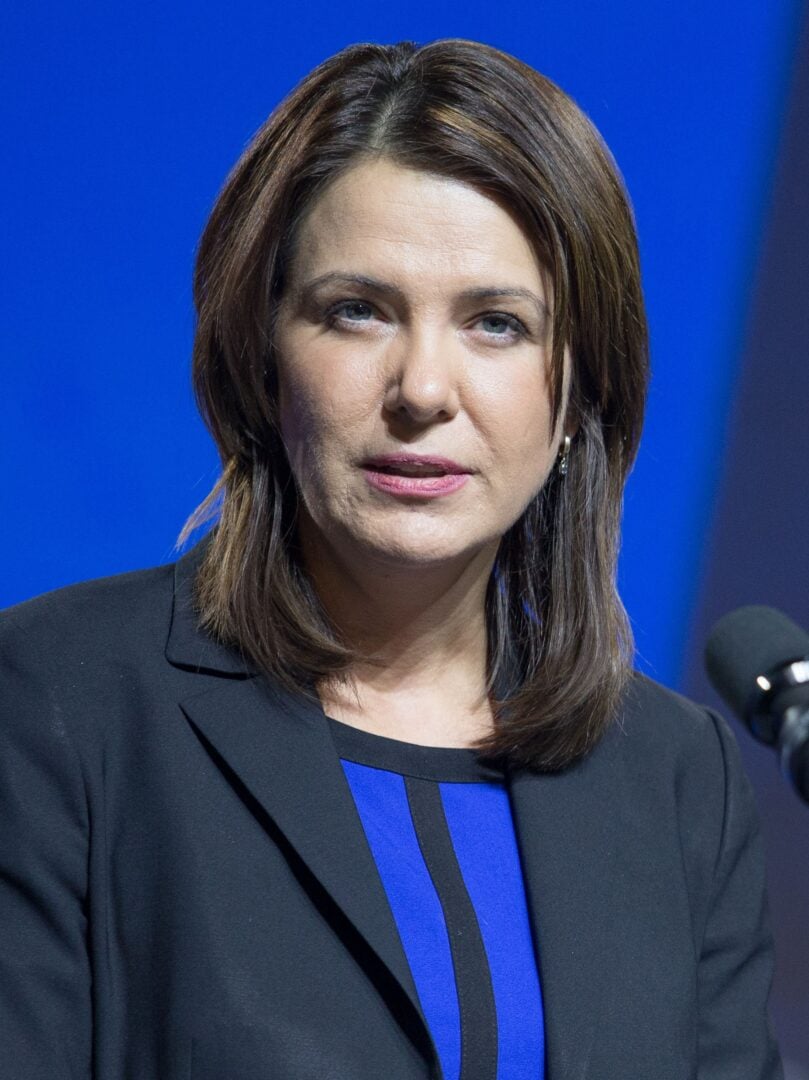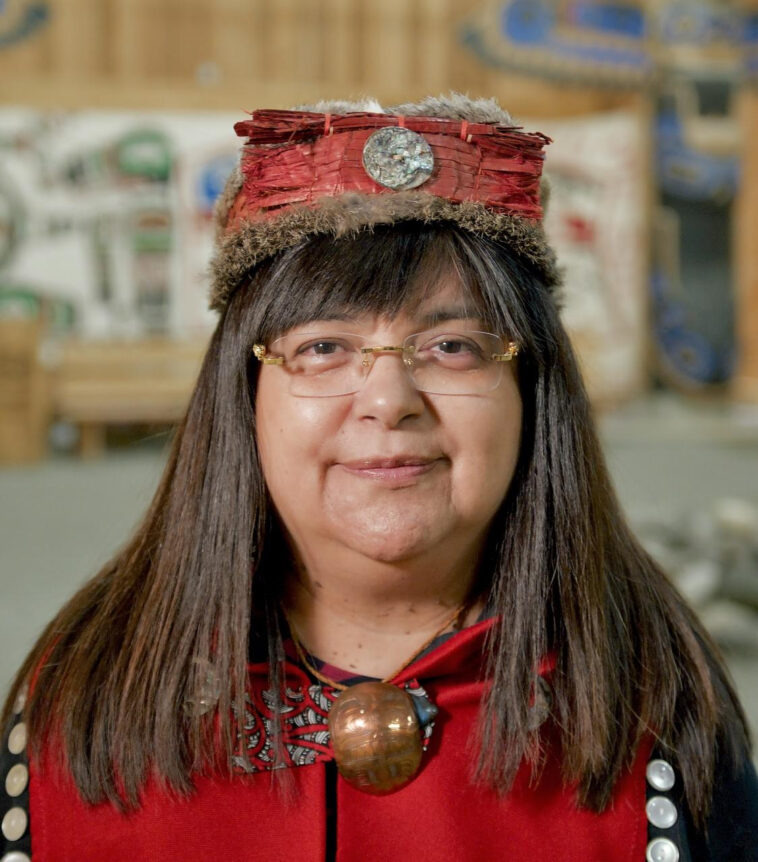By Sonal Gupta, Local Journalism Initiative, Canada’s National Observer
Alberta Premier Danielle Smith’s plan to build a new oil pipeline to British Columbia’s north coast is facing strong opposition from BC First Nations, who say the project not only threatens their traditional territories but also deepens divisions across Canada. Some are promising a new era of resistance and blockades akin to the Northern Gateway era.
“[T]here is no support from Coastal First Nations for a pipeline and oil tankers project in our coastal waters,” said Marilyn Slett, president of Coastal First Nations-Great Bear Initiative and chief councillor of the Heiltsuk Nation, in a press release on Wednesday.
At Smith’s press conference, Alberta’s Minister of Indigenous Relations Rajan Sawhney said she has been speaking with First Nations between Alberta and the coast, and is encouraged that some nations expressed interest in equity ownership in a new pipeline. But Slett told Canada’s National Observer none of the coastal communities were involved in the proposed pipeline discussions, and the nations remain firm that their people do not support any new pipeline.
“We did not support this type of project, and we certainly don’t support it now.”
Marilyn Slett, President of Coastal First Nations-Great Bear Initiative and Chief Councillor of the Heiltsuk Nation
The nations have spent decades fighting to keep crude oil tankers out of their territorial waters, alongside communities and municipalities of the north and Central Coast and Haida Gwaii. Slett pointed to years of participation in the National Energy Board’s Joint Review Panel on the failed Northern Gateway project, which she described as conclusive: “We did not support this type of project, and we certainly don’t support it now.”
In 2019, Ottawa passed Bill C-48, the Oil Tanker Moratorium Act, prohibiting oil tankers carrying more than 12,500 metric tonnes of crude oil or heavy oil products from stopping, loading or unloading at ports or marine installations along British Columbia’s north coast.
In her announcement, Smith spoke of the proposed project as “a test of whether Canada works as a country.” But to Slett, talk of oil pipelines and tankers — and the risk of a catastrophic spill in BC’s coastal waters — “is not nation-building,” but instead, threatens to erode First Nations’ support for meaningful projects.

Danielle Shaw, chief councillor of the Wuikinuxv Nation, acknowledged that while Smith has a responsibility to champion Alberta’s interests, she does not have the authority to dictate which projects advance or how they unfold in other provinces or regions. She described Smith’s plan as a “major red flag” that could fracture communities, rather than bring them together. “Given the political climate, we need to come together and move in the same direction,” she said.
Slett accused Smith of moving “way outside of jurisdiction,” using “backdoor methods” that disrespect Indigenous Peoples and British Columbia. “This behaviour will only divide us, and it really sets a dangerous precedent for future relationships,” she said.
“It’s not a matter of if there’s an oil spill, it’s when there’s an oil spill, and the estimated cost of cleanup today is upwards of $10 billion.”
Danielle Shaw, Chief Councillor of the Wuikinuxv Nation
Shaw said economic uncertainty in BC has left many struggling to feed their families, but Indigenous nations are working with the federal government to build a resilient, environmentally responsible economy, with two of the five fast-tracked infrastructure projects announced so far located in the province. However, oil pipelines and tankers are not part of that picture, she said: “It’s not a matter of if there’s an oil spill, it’s when there’s an oil spill, and the estimated cost of cleanup today is upwards of $10 billion.”
In 2016, the Nathan E. Stewart tugboat sank near Bella Bella in Heiltsuk territory after running aground. It spilled over 110,000 litres of diesel fuel and heavy oils into the sea, causing serious damage to the local environment and harming important marine and food-harvesting areas for the Heiltsuk people.
Shaw said an oil spill could never be fully cleaned up and would have devastating impacts on their territories, leaving communities to bear the consequences for generations to come.
Grand Chief Stewart Phillip, president of the Union of BC Indian Chiefs, said any proposal to force a new oil pipeline through British Columbia’s North Coast is seen as a direct assault on the constitutionally protected rights and title of the First Nations who steward these lands and waters. He called it a “blatant attempt to tear up” the federal North Coast Tanker Ban, which protects one of the world’s most pristine, rich coastal ecosystems from disaster.
“Deja vu! Back to the fossil fuel industry’s anti-pipeline battleground. Back to the courts. Back to the blockades.”
Grand Chief Stewart Phillip, President of the Union of BC Indian Chiefs
He said the pipeline proposal could trigger a new wave of resistance, with Indigenous communities prepared to launch legal challenges and organize direct action blockades, as seen during past conflicts over the Northern Gateway and Trans Mountain projects. “Deja vu! Back to the fossil fuel industry’s anti-pipeline battleground. Back to the courts. Back to the blockades,” he wrote in a text message.
Robert Phillips, political executive of the First Nations Summit, said there is a critical need for free, prior and informed consent as required by Bills 14 and 15 in BC and federal legislation. He called for creation of a national First Nations action plan and an intergovernmental resource governance table to avoid court battles and protests by fostering shared strategy and meaningful participation.
“If proposals are going in, they should be consulting with us, giving us information. We should be consulted along the way,” Phillips said. “If it’s just ramming it all through and we’re gonna build a pipeline, then it’s going to be a disaster.”
“We will use every tool in our toolbox to make sure that our coast remains tanker free.”
Marilyn Slett, President of Coastal First Nations-Great Bear Initiative and Chief Councillor of the Heiltsuk Nation
Slett said BC Premier David Eby has made it clear that oil tankers in Indigenous territories are a “red line” for the First Nations and has urged Smith to stop pushing the pipeline proposal, calling it a “non-existent project” that threatens British Columbia’s economy. “We respectfully ask that Premier Smith remain in her own jurisdiction: the province of Alberta.”
The proposal remains completely unacceptable, Slett said.
“We’ve said that before, and our stance has not changed and will not change for any other reason. We will use every tool in our toolbox to make sure that our coast remains tanker-free.”




